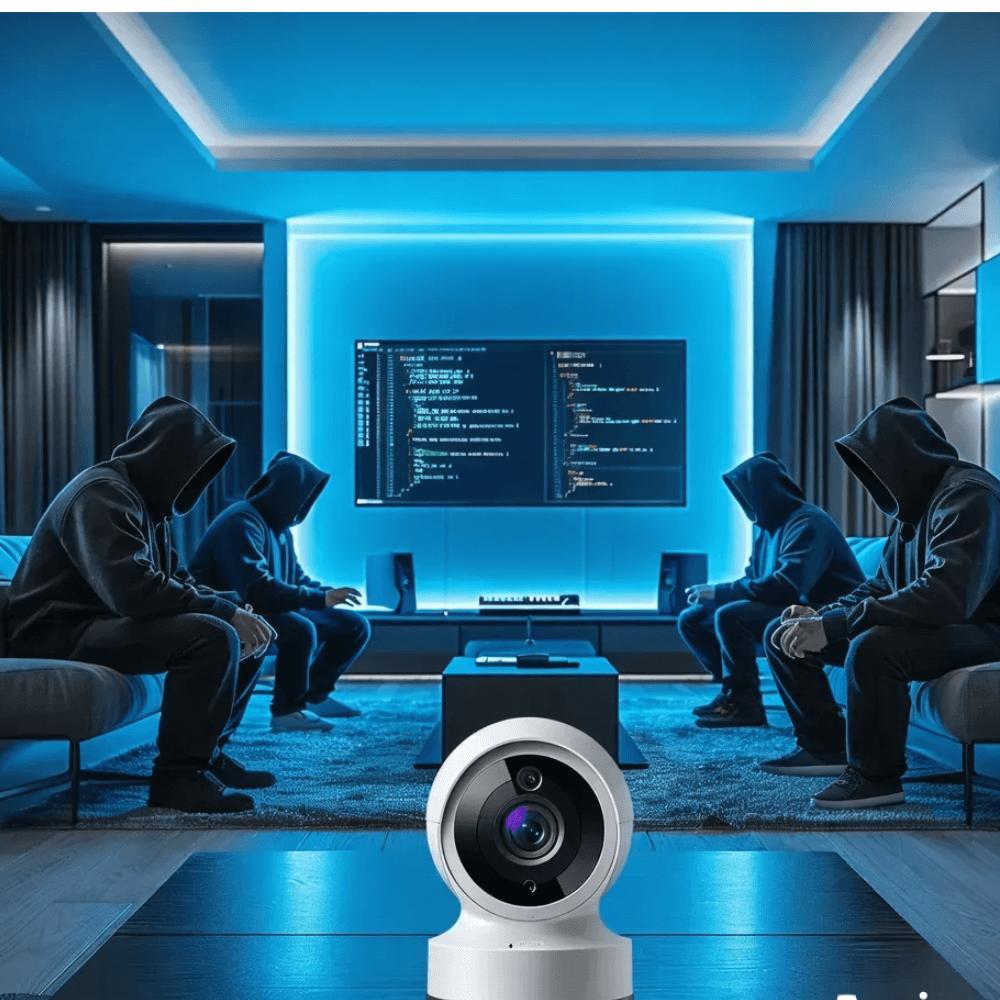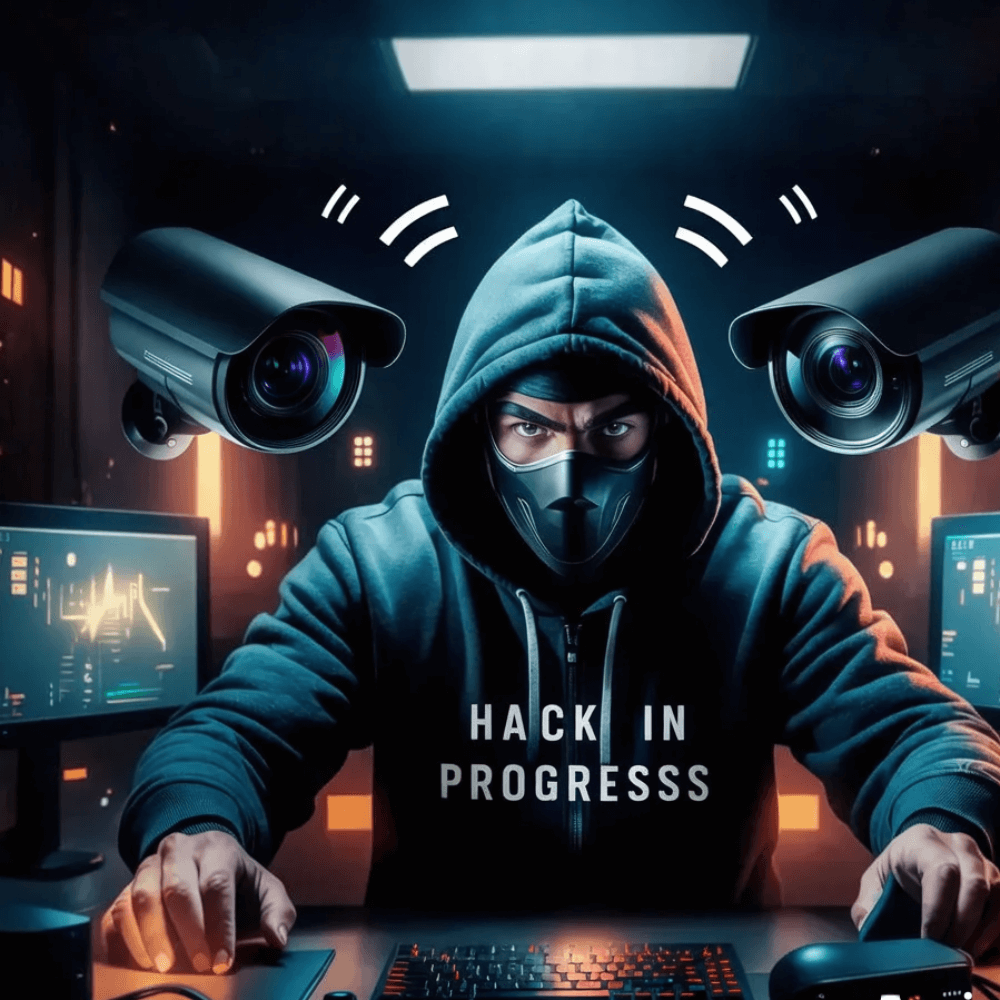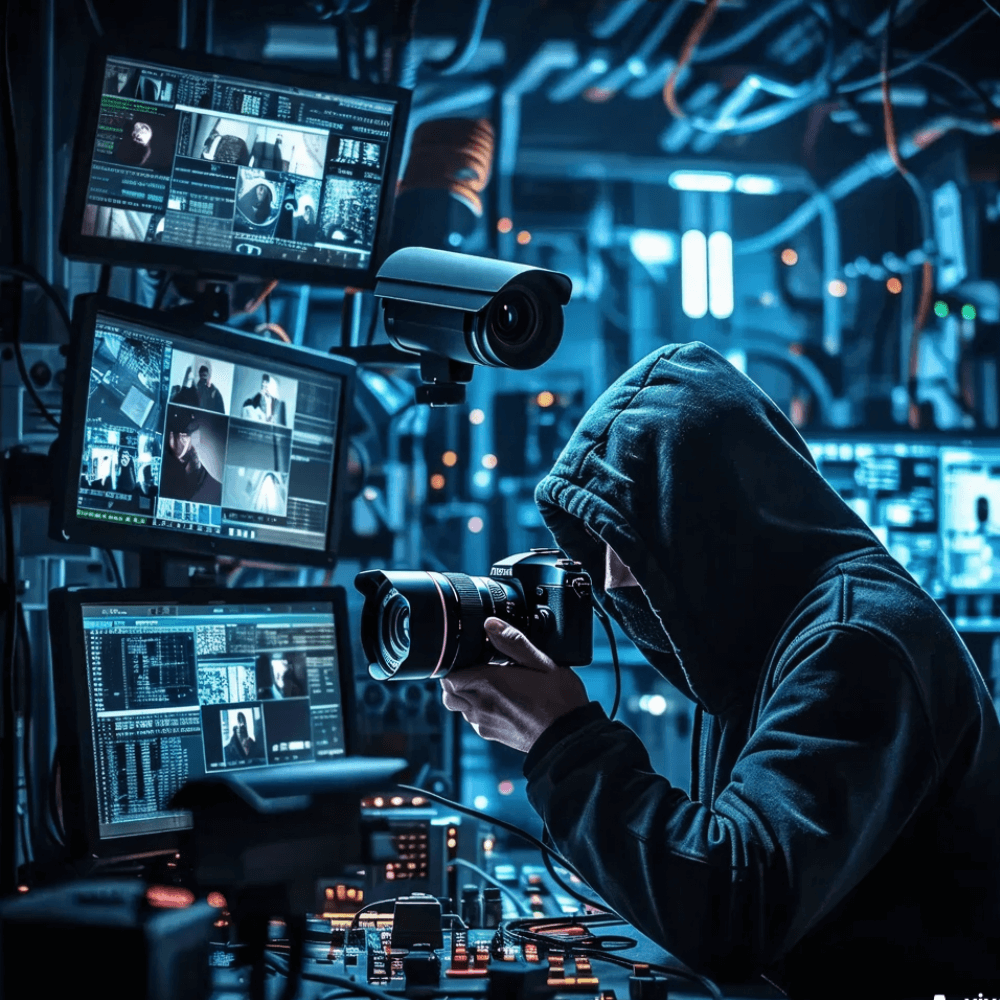According to reports, about 13% of home security users have experienced their security cameras being hacked, While the search results don’t detail specific percentages for wired vs. wireless camera hacks, it’s clear that wireless cameras face a higher risk due to their connection method.

In modern countries, almost every electronic device can be hacked. However, security cameras and systems are a special case.
We use these systems to watch over our important places and things. The main reason someone might try to hack a security camera is to spy on what it’s recording.
The risk of being hacked is much higher when the camera is connected to the internet for remote viewing. If you set up your security system to only work offline (not connected to the internet), it is much harder for a hacker to access it.
The good news is that there are ways to protect yourself. People in developed countries have solutions to prevent these hacks. By being careful and following some important steps, you can keep your security cameras safe and have peace of mind.
Can Wifi Security Cameras Be Hacked?
- An Internet of Things (IoT) Security Foundation report found that 40% of IoT devices, including wireless cameras, have identified weaknesses. These weaknesses often come from easy-to-guess passwords, outdated software, and poorly secured network settings.
- According to a 2019 survey by the cybersecurity firm Bitdefender, about 70% of respondents reported concerns about the security of their wireless cameras, with many acknowledging that they had experienced unauthorized access.
Since the wifi security camera is connected to the network system, the devices that are connected to the network system are more likely to be hacked.

How do I know if my security camera has been hacked?
There are some features. Strange Sounds and Unfamiliar Voices, If you see that your WiFi security camera is moving automatically, or the LED light of the camera is blinking, if your camera Security Settings Change, the account password has been changed, you have to log in to the app repeatedly for camera monitoring, If you suspect your camera has been hacked, disconnect it from the network immediately and change all related passwords. and the camera video footage looks different, the video store is showing less or more, if these issues are present, you should understand that your camera has been hacked.
Bloomberg reports., suffered a major security breach. Hackers gained access to more than 150,000 of the company’s cameras, including cameras in Tesla factories and warehouses, Cloudflare offices, Equinox gyms, hospitals, prisons, schools, police stations, and Varkada’s own offices.
Can Wired Security Cameras Be Hacked?
Wired cameras are not completely safe from hacking. typically face fewer risks because they are not reliant on Wi-Fi networks. A study from Palo Alto Networks suggested that wired devices can be more secure due to their limited exposure to external threats. Wired systems can still be compromised if attackers gain physical access to the network or exploit vulnerabilities in connected devices, but this scenario is less common than remote hacking attempts on wireless systems. this is one reason why I do not recommend WiFi cameras only you can fully secure a WiFi network. If it is possible to buy the wired camera.

How to Secure Your Home Security Camera from Hackers?
- Choose a Quality Home Security Camera
To buy a good quality home security camera you can get an idea from the home security system your neighbor is using, I am a home security expert some brands I can suggest to you,
Research Brands: Invest in reputable brands like Ring, Nest, or Eufy. These companies are known for their reliable products and customer support,
Avoid Knockoffs: Steer clear of cheap or used cameras. These often lack essential features and may be vulnerable to hacking, putting your home at risk.
Secure Your Wi-Fi Network to protect your Camera Hack
Create Strong Passwords: We are dependent on the network in the developed world, we can’t expect anything else except this and we are also dependent on the network system for home security, that’s why if we don’t want to face our home security system hack then we have to secure our home network system. Changing the default password is very important for network security and setting up a strong password is essential Use complex passwords that are a unique, complex combination of characters that are difficult for both your Wi-Fi and camera apps to prevent unauthorized access.
Wi-Fi Security Protocols: The first reason among the main reasons for security camera hacking is that your wifi network protocols are very important for being connected to the network, Always utilize WPA2 or WPA3 for encryption, which offers better protection against intruders.
Firewall Activation: Network security is required to keep your security system free from hacking and firewall activation for network security protection must enable a firewall to protect a network from unauthorized access and other threats.
Change Default Settings
Default Passwords: Change factory-set passwords immediately to secure your devices.
Network Names: Alter the default SSID and usernames to obscure your network identity, making it harder for attackers to target you.
Is a strong password important to keep your security camera hack-free?
Yes, a strong password is crucial to keeping your security camera hack-free. Weak or default passwords make it easy for hackers to gain unauthorized access to your system. A strong password typically includes a mix of uppercase and lowercase letters, numbers, and special characters, and should be long (at least 12 characters). Regularly updating your password and enabling two-factor authentication (if available) can further enhance security and protect your camera from potential cyber threats.
Enable Two-Factor Authentication (2FA)
Implementing 2FA provides an extra layer of security by requiring a second form of verification, which helps protect against unauthorized access.
Regular Software Updates
Automatic Updates: Set your cameras and apps to update automatically to ensure you have the latest security patches. Manual Checks: Periodically verify updates manually to address any vulnerabilities that may arise.
Monitor Remote Access
Limit Remote Viewing: Disable remote access when not needed to minimize exposure to potential threats. Use a VPN: Secure remote access through a Virtual Private Network (VPN) for added protection.
Physical Security Measures
Try to keep your security control room close to your location so that you can keep your security control room within your control
Camera Placement: Position cameras strategically to monitor entry points effectively, maximizing coverage of vulnerable areas.Secure cables properly to prevent tampering or disconnection.
What to Do If Hacked
Disconnect the camera from the network to stop any further unauthorized access, Immediately change the passwords for both the camera and any related accounts. Next, review your security practices and reinforce them by implementing stronger measures as necessary.
By following these steps, you can significantly enhance the security of your home surveillance system and protect your property from potential threats.
Frequently Asked Questions on Securing Home Security Cameras from Hackers
What should I do if I suspect my camera has been hacked?
If you think your camera has been compromised: Disconnect it from the internet immediately. Change your passwords for the camera and your Wi-Fi network.
Can using public Wi-Fi affect my camera’s security?
Yes, using public Wi-Fi can expose your camera to hacking risks. Always connect your cameras to a secure private network instead.
Should I disable remote viewing features?
If you don’t need remote access to your camera feed, consider disabling this feature to reduce potential vulnerabilities. If remote viewing is essential,
Why do I need to secure my home security cameras?
Home security cameras are connected to the internet, making them vulnerable to hacking. If hackers gain access, they can view your camera feed, change settings, or even access your home network. Securing your cameras helps protect your privacy and safety.
